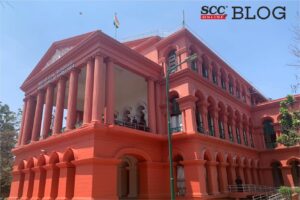Karnataka High Court: Suraj Govindaraj, J. dismissed the petition as being devoid of merits.
The facts of the case are such that petitioner 1 is a registered association of the advertising agencies, in the business of advertisement on the advertisement hoardings licensed by respondent 2 Hubballi Dharwad Mahanagara Palike and are also registered as dealers under S. 22 of the Karnataka Value Added Taxes Act. The petitioners 2 to 6 are the members of the petitioner 1. A demand notice was issued upon the petitioners to make payment of advertisement tax as regards advertisement hoardings used by them. The instant petition was filed under A 226 and 227 of the Constitution of India seeking issuance of writ to set aside the demand notice and writ of prohibition to the respondents not to meddle with the advertisement displays and hoardings of the petitioners.
Counsel for petitioners submitted that on the enactment of Goods and Services Tax Act the authority of the respondents to either levy or collect advertisement tax is ousted. The respondents have collected the advertisement tax in terms of Section 134 of the Karnataka Municipal Corporations Act, 1976. The power under Section 134 of the KMC Act flows from Entry 54, List II of Schedule VII of the Constitution of India. The entry 54 having been deleted the said power is divested. Thus, there could be no demand for advertisement tax post the enactment of GST Act and deletion of Entry 54.
Counsel for respondents Mr GI Gachchinmath submitted that the power of respondent 2 to collect the advertisement tax continues under Section 134 of KMC Act. In the decision relied upon by the counsel for the petitioner, said power had been deleted, whereas no such deletion has occurred in the KMC Act.
The Court observed that in the entire transaction of GST, the petitioners are only a collecting agency who collects the GST payable on the service rendered and deposits the same with the authorities, the incidence of tax, i.e., GST being on the services rendered or goods supplied, the obligation of payment being on the person availing the service and or receiving the goods. The incidence of GST is on the service rendered by the petitioner to its clients and has nothing to do with respondent 2-HDMC. The transaction with HDMC is the permission and or license granted by the HDMC to put up hoarding and or use a hoarding either on the land belonging to the HDMC and or on land belonging to a private party.
The Court further observed that there are two distinct transactions. The incidence of tax on both transactions are different. The first transaction is the permission by respondent No.2-HDMC to put up a hoarding or advertisement to use their hoarding for the purpose of advertisement, as regards which respondent No.1-HDMC charges the fee or advertisement tax. The second transaction is on the petitioners making use of the hoarding to display advertisements of its clients towards which the petitioners charge their client which is a supply of services or goods as regards which the GST is liable to be paid. Both the transactions being independent and distinct the incidence of both the GST and advertisement fee being on two distinct transactions inasmuch as the GST not being charged by the respondent 1- HDMC and advertisement free not being charged by the GST authorities.
The Court thus held “there is no conflict between the power to levy GST under GST Act and power of Municipal Corporation to levy advertisement fee or advertisement tax under Section 134 of the Karnataka Municipal Corporations Act.” [Hubballi Dharwad Advertisers Association v. State of Karnataka, Writ Petition No. 104172 of 2021, decided on 21-04-2022]

